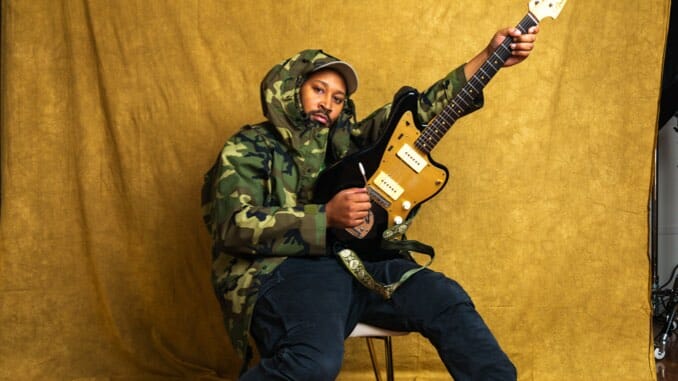Bartees Strange on Farm to Table and the Joy of Community
"Everyone is just people in a room. And from there, the spirit can move. We can connect and we can explore together. That's the goal, and it's the most beautiful part in music"
Photo by Luke Piotrowski
A week before I rang up Bartees Strange to talk about his new record, Farm to Table, he returned home to Oklahoma to play a 10-song set. “I’ve been dreaming about that show since I was 15 years old,” Strange excitedly tells me over the phone. “The Tower Theatre is a really amazing and legendary place. I used to watch kung-fu movies there when I was in high school.” Strange, the choral polymath son of an Air Force geodetic engineer and a traveling church and opera singer, grew up a half-hour outside of Oklahoma City, in Mustang. His family settled in the area after migrating around Europe during Strange’s first few years on Earth. Though the Sooner State quickly became home base for Strange, his mom and his siblings while his dad served overseas, he had his sights set east, and he’d spend stints in D.C. and NYC before holing up in his current spot, Falls Church, Virginia. “It was amazing to leave Oklahoma right in the middle of college, come to the East Coast and figure myself out, and then come back like this,” he recalls, “because everyone in Oklahoma that I grew up with, they know me as a musician. It was cool to come back and see everyone again and reconnect with music being the foundation.”
I mess with Bartees Strange for a number of reasons, but, mainly, it’s because he’s one of the brightest lights we’ve got in this godforsaken landscape of hurt. An essential post-genre troubadour, Strange is a game-changer, blurring the line between producer and performer while fostering a community within every audience he plays for. When I saw him open for Lucy Dacus at the Newport in Columbus last October, he blew the room away just after dusk fell onto High Street outside. Strange’s stage presence is gravitational—he makes everyone in the audience, even the balcony dwellers, feel front row. “My school of philosophy on shows is: It’s a gift,” he says. “I have a gift and I get to share it with people, and I get to watch them react to this thing I love doing. I never thought I’d get to do any of this, so every time I play, I’m just like, ‘This is the coolest thing in the world. I wrote these songs and I get to play them with my heroes.’”
Speaking of heroes, when I eagerly tell Strange there are rhythmic moments on his new album that sound like The National’s Trouble Will Find Me, he responds by mimicking Bryan Devendorf’s drums from “Apartment Story.” “Dog, ‘Black Gold’ is literally Big Red Machine drums,” he tells me. “I pull from the [Aaron] Dessner textbook all the time. ‘Heavy Heart,’ that’s Boxer drums. It’s ‘Geese of Beverly Road.’ I live off that shit.” Strange affectionately likens vocalist Matt Berninger’s onstage translations of Dessner’s arrangements as “like watching a politician speak”—a formula he channels in his own performances. His first major release, 2020’s Say Goodbye to Pretty Boy EP, was comprised of National covers; the Cincinnati, Ohio, quintet is his favorite band. Immediately, there’s a kinship between us there, even though we’ve never met in person. Few artists will so passionately talk shop about the same old shit over the phone; even fewer speak in a cadence littered with such excitement about influences on a weekday morning.
-

-

-

-

-

-

-

-

-

-

-

-

-

-

-

-

-

-

-

-

-

-

-

-

-

-

-

-

-

-

-

-

-

-

-

-

-

-

-

-








































